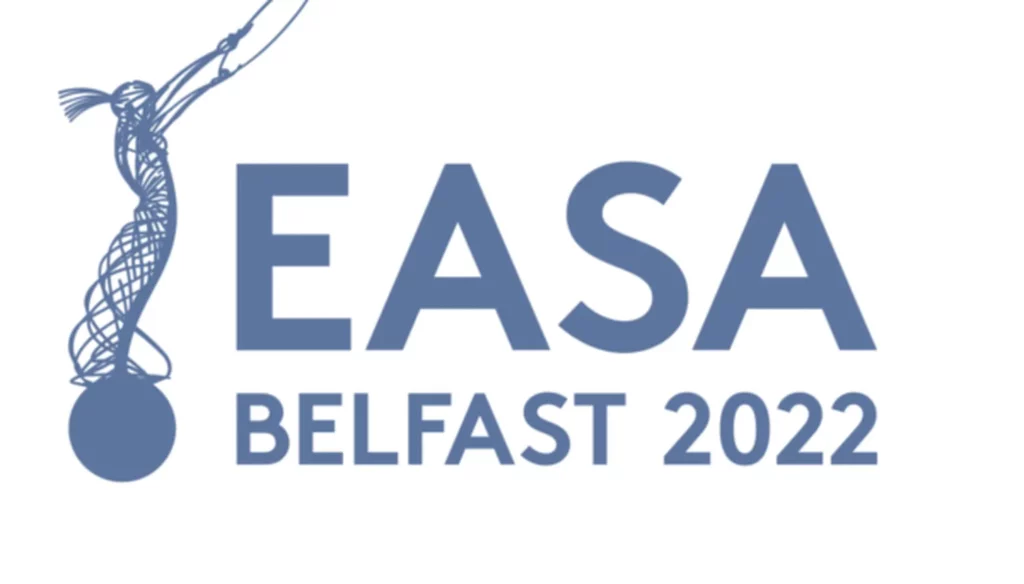La 17ème édition du colloque EASA (European Association for Social Anthropologists) a eu lieu à Belfast du 26 au 29 juillet 2022 auprès de la School of History, Anthropology, Philosphy and Politics at Queen’s University Belfast. La thématique du colloque a été : Transformation, Hope and the Commons.
https://easaonline.org/conferences/easa2022/programme#11973.66283
La suivante communication a été présentée lors du colloque international :
Stoica G. (2022), “If it’s just to pick up three pieces of rubbish, there is no point of having an educational marine area”
Paper short abstract:
In this paper, we will discuss the case of the marine educational areas established in the Reunion Island asking the following question: In which way the establishment of marine educational areas changed the relationship that children have with the marine environement ?
Paper long abstract:
Born in the Marquesas Islands in French Polynesia, the « marine educational areas » represent a concept that aim at the participative management of a coastal marine area by primary school pupils under the supervision of their teacher and a scientific referent. As a reminder, it were the pupils of the Vaitahu primary school (Tahuata Island), during exchanges with scientists from the Pakaihi i te moana oceanographic campaign, who expressed their desire to be responsible for a marine area located near their school, which led to the establishment of the first educational marine area in 2012. Three years later, during the 2015 Paris Conference on Climate Change (COP 21), a partnership was signed by Ségolène Royal, Minister in charge of the environment, and Edouard Fritch, President of the French Polynesian government. This partnership has led to the development of marine educational areas with 8 pilot schools in 2016 in mainland France and overseas. Presently, there are more than 200 marine educational areas projects. In this context, the main actors are children who actively participate in educational projects set up locally by teachers in line with national programmes with the aim of educating them about the marine environment and making them responsible for their future actions to preserve nature. In this paper, we will discuss the case of the marine educational areas established in the Reunion island asking the following questions : In which way the establishment of marine educational areas changed the relationship that children have with the marine environement ?
Cette communication a été présenté dans le cadre du Panel scientifique intitulé Environmental education for transformation :
Stoica, G., Tribollet A. (Convenors) (2022). Environmental education for transformation: you are never too small to make a difference. Scientific Panel organisé dans le cadre du Colloque International
17th EASA Biennial Conference Transformation, hope and the commons, Belfast 26-29 July 2023
Short Abstract:
This panel invites papers offering a critical examination of the environmental education practices, environmental awareness programs, Fridays for Future actions etc. We particularly welcome contributions on what we term « children empowerment » in the context of a fast-changing society.
Long Abstract:
Despite the « code red » warning from the last Intergovernmental Panel on Climate Change report, the Earth Summits conferences and the appearance of Anthropocene new geological epoch (Crutzen, 2002) few concrete initiatives and proposals for changes have been advanced by political representatives from different countries. It is in this context that a powerful voice appeared, that of Greta Thunberg at the Cop 24 United Nations climate change summit in 2018. The Greta Thunberg speeches have contributed to an increased awareness about environment and climate change in both children and adults. Her urgent call for actions has been sustained by millions of teenagers that support her in challenging political institutions and powerful personalities. All this in a context, where there is a need to empower future generations so that they can act and think critically about the accelerated changes (Eriksen 2016) associated with environmentalism and sustainability. Considering that environmental education (Kopnina 2012) is left at the margins of the teaching activities at the benefit of core subjects such as Literacy and Math and that children’s proposals are not taken seriously, this panel offers a critical examination of the environmental education practices but also of the actions that are happening outside of the school i.e. environmental awareness programs, scientific educational programs, Fridays for Future actions etc. We welcome empirically informed and/or theoretical discussions that address one or more of the following themes: youth activism and climate change, children empowerment and environmental governance, NGOs and environmental protection, environmental awareness and schools curricula.
Click here to see the accepter papers and visualize the panel video : https://nomadit.co.uk/conference/easa2022/p/11973

